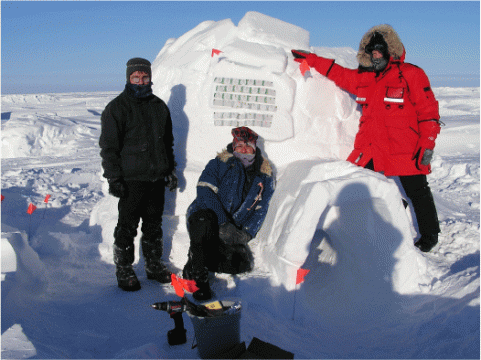
Llyd Wells (left) was a part of a team that overwintered in Franklin Bay in the Canadian Arctic by freezing an icebreaker into the bay to use as a field station.
My work in the Arctic, using both culture-based and molecular approaches, has focused on the characteristics, ecology and biogeochemical consequences of microorganisms, particularly viruses and Archaea, in the water column and sea ice, predominantly around the Mackenzie River estuary, Franklin Bay and the Northwest Passage of the Canadian Arctic. Among my peer-reviewed and published findings are the quantitatively significant role of viral lysis in the microbial food web during Arctic winter, characterization of the most cold-active bacteriophage known to date (capable of virus production at ≤–10°C!), and the strong association of Arctic Archaea with particles and particulate organic nitrogen, perhaps related to the now-known capacity of some of them for nitrification. In part due to my role co-teaching the capstone field research classes for undergraduate seniors at the University of Washington, and in part due to my participation there in an NSF IGERT program focused on astrobiology--in which field I have published on instrumentation, Mars sampling, and early Earth and Moon geology--I have become increasingly focused on (and have written about) interdisciplinary education at the undergraduate and graduate levels. The last decade I have spent further educating myself especially in the humanities and developing coursework that is deeply interdisciplinary, not only among the sciences but bridging the extremely dangerous two-culture divide between sciences and humanities, through positions at the Center for Northern Studies at Sterling College (Vermont), the Penn Humanities Forum at the University of Pennsylvania, and St. John's College in Santa Fe, NM, where I currently work, study and teach in an all-required, Great Books-based curriculum.
Armstrong JC, Wells LE, Gonzalez G (2002) Rummaging through Earth’s attic for remains of ancient life. Icarus 160: 183–196.
Wells LE, Armstrong JC, Gonzalez G (2003) Reseeding of early Earth by impacts of returning ejecta during the late heavy bombardment. Icarus 162: 38–46.
Wells LE, Deming JW (2003) Abundance of Bacteria, the Cytophaga-Flavobacterium cluster and Archaea in cold oligotrophic waters and nepheloid layers of the Northwest Passage, Canadian Archipelago. Aquat Microb Ecol 31: 19–31.
Phillips H, Wells LE, Johnson RV II, Elliott S, Deming JW (2003) LAREDO: A new instrument for sampling and in situ incubation of deep-sea hydrothermal vent fluids. Deep-Sea Res I 50: 1375–1387.
Wells LE, Cordray M, Bowerman S, Miller LA, Vincent WF, Deming JW (2006) Archaea in
particle-rich waters of the Beaufort Shelf and Franklin Bay, Canadian Arctic: Clues to an
allochthonous origin? Limnol Oceanogr 51: 47–59.
Wells LE, Deming JW (2006a) Modeled and measured dynamics of viruses in Arctic winter sea-ice brines. Environ Microbiol 8: 1115–1121.
Wells LE, Deming JW (2006b) Significance of bacterivory and viral lysis in bottom waters of Franklin Bay, Canadian Arctic, during winter. Aquat Microb Ecol 43: 209–221.
Wells LE, Deming JW (2006c) Characterization of a cold-active bacteriophage on two psychrophilic marine hosts. Aquat Microb Ecol 45: 15-29.
Wells LE (2007) Cold-active viruses. Pages 157-173 in Margesin R, Schinner F, Marx J-C, Gerday C (eds.) Psychrophiles: From Biodiversity to Biotechnology. Springer Verlag, Berlin.
Wells LE, Armstrong JC, Huber JA (2007) Disciplinary aspirations and educational opportunities. Pages 547-557 (Chapter 28) in: Sullivan WT, Baross JA (eds.) Planets and Life: The Emerging Science of Astrobiology. Cambridge University Press, Cambridge.
Kminek G and 34 others (2010) Report of the COSPAR Mars Special Regions Colloquium. Advances in Space Research 46(6): 811-829.
De Viri Natura: Inaugurating Viral Criticism Within Biology, proposal submitted to Prickly Paradigm Press.